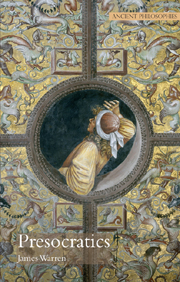Book contents
- Frontmatter
- Contents
- Acknowledgements
- Sources and abbreviations
- Chronology
- Map of the ancient Mediterranean
- 1 Introduction: reading Presocratic philosophy
- 2 Ionian beginnings
- 3 Xenophanes
- 4 The oracles of Heraclitus
- 5 Parmenides
- 6 Reactions to Parmenides
- 7 Anaxagoras
- 8 Empedocles
- 9 Democritus and Leucippus
- 10 Epilogue
- Guide to further reading
- Notes
- Bibliography
- Index of passages
- Index
4 - The oracles of Heraclitus
- Frontmatter
- Contents
- Acknowledgements
- Sources and abbreviations
- Chronology
- Map of the ancient Mediterranean
- 1 Introduction: reading Presocratic philosophy
- 2 Ionian beginnings
- 3 Xenophanes
- 4 The oracles of Heraclitus
- 5 Parmenides
- 6 Reactions to Parmenides
- 7 Anaxagoras
- 8 Empedocles
- 9 Democritus and Leucippus
- 10 Epilogue
- Guide to further reading
- Notes
- Bibliography
- Index of passages
- Index
Summary
Heraclitus lived in Ephesus on the Ionian coast at the turn of the sixth and fifth centuries BCE. He shares many of the concerns of his fellow Ionians and so it is possible to think about Heraclitus' conception of the basic arkhai of the world, how the elements interrelate and so on. He also shares with Xenophanes an interest in morality and theology, and a set of concerns about the right way to understand knowledge, wisdom and expertise. But there are several striking facets of his thought that set him apart from what we know of these predecessors. The remaining fragments, when combined and interpreted as a whole, produce an overall worldview that encompasses not merely a set of claims about how the universe is, but also a view of the place of human beings within that world and, as an essential part of this, a set of thoughts about the proper manner in which we ought to think about ourselves in relation to the world in which we live. He also chose to express these thoughts in a remarkable manner: a tactic that was designed with a particular educational philosophy in mind.
Heraclitus undoubtedly exerted a profound influence on later philosophers. Indeed, it is perhaps true to say that, of the Presocratics, Heraclitus had an influence on ancient philosophy second only to that of Parmenides. For example, there are sure signs of the influence of aspects of Heraclitus' cosmology on the Stoics.
- Type
- Chapter
- Information
- Presocratics , pp. 57 - 76Publisher: Acumen PublishingPrint publication year: 2007



